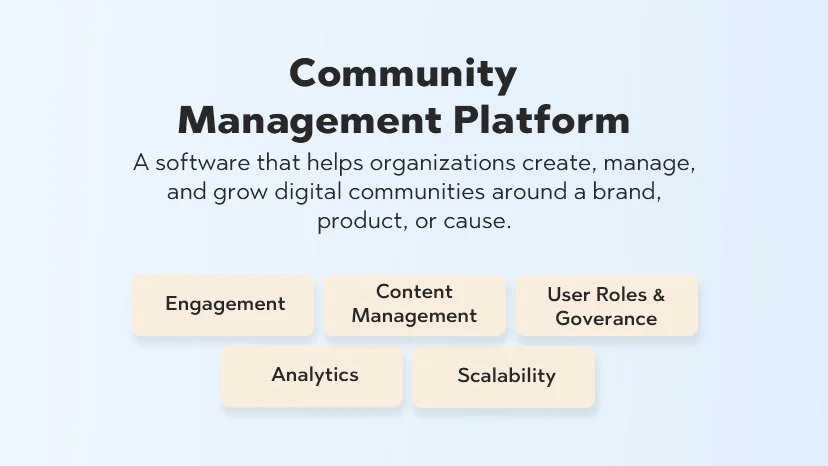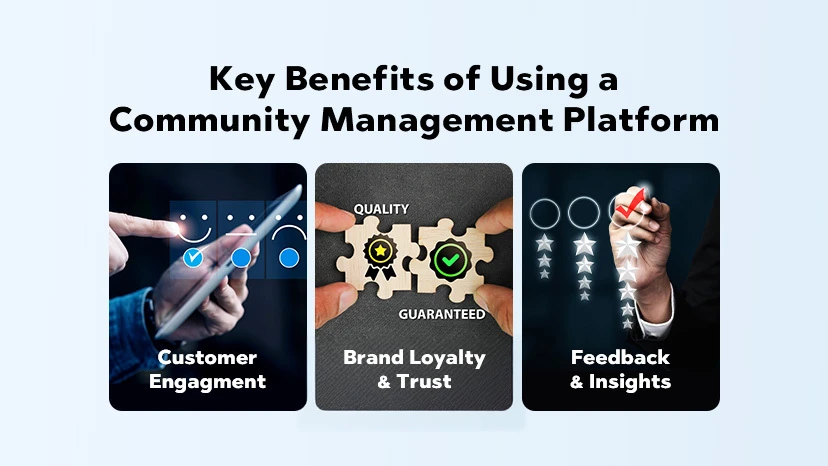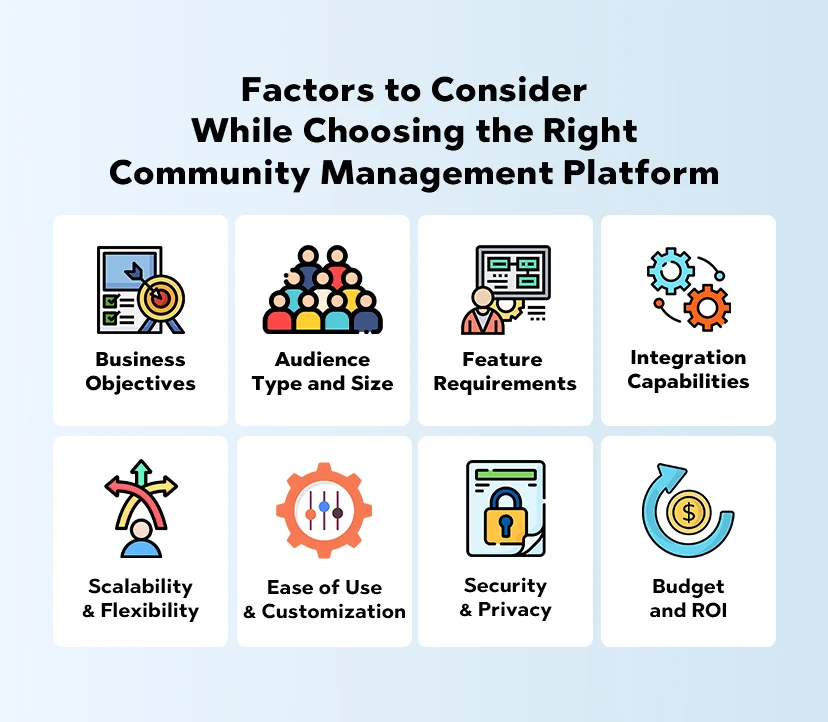How to Choose the Right Community Management Platform for Your Business
In today’s world, where digital technology drives consumerism, having a robust online community is not merely desirable but essential. A community creates brand loyalty among different user types (from brands to consumers and/or creators). It allows brands to drive engagement from different types of users and audiences, transforming customers into advocates (and brand ambassadors no less!). Community benefit means you have a win-win-win… but to realise these rewards, the right community management platform is key. Your platform choice influences how members interact, how your brand is experienced, and how you’re going to scale it. Using the right platform empowers your community to grow and flourish; using the wrong platform will stifle growth and frustrate your users! This guide will help you work through the community management landscape so you can find the tools you need to be most successful and best align with your business goals.
What Is a Community Management Platform?
A community management platform is software that helps organizations create, manage, and grow digital communities around a brand, product, or cause. It is a central hub for communication, content, and member engagement.

Purpose and Growth Impact:
- It enables real-time conversations, structured forums, and event management.
- Helps companies improve brand trust, streamline support, and gather valuable insights.
These platforms offer tools for:
- Engagement: chats, events, and discussion forums.
- Content Management: Creating and sharing content.
- User Roles & Governance: Admin tools and permission settings.
- Analytics: Member behavior and sentiment tracking.
- Scalability: Support for growing member bases and subgroups.
Popular platforms include Discourse, Khoros, Open Social, Sprout Social, and others like Slack and Discord for informal setups.
Key Benefits of Using a Community Management Platform
By choosing your community platform wisely, you can reap many benefits:
1. Customer Engagement
A fantastic platform will drive engagement. Polls, live events, Q&As, threaded discussions, and other tools keep your users engaged.
2. Brand Loyalty & Trust
Communities foster belonging. The more value members find, the more likely they will develop loyalty to your brand.

3. Feedback & Insights
Feedback loops allow you to continuously improve your products and services. Feedback from engaged users is very often more authentic and valuable than standard surveys.
4. Support & Knowledge Sharing
Peer-to-peer support lessens your burden on customer service. Knowledge bases and FAQs driven by community content become more efficient over time as a result of community use.
Find social rules that support these benefits all in one place.
Factors to Consider While Choosing the Right Community Management Platform
Before you commit to any community platform, you need more than just a feature list—you need clarity. What’s your goal? Who’s your audience? Will it scale as you grow? The ideal platform should fulfill all requirements, from integration to security, while staying within your budget. Here’s a smart breakdown of what matters when choosing a community management platform.
1. Business Objectives
Are you aiming to improve support, increase engagement, or boost brand presence? Define your primary goal.
2. Audience Type and Size
Know your members: B2B or B2C, small niche or large public group? Different audiences require different features.
3. Feature Requirements
Do you need forums, gamification, analytics, or moderation tools? List must-haves versus nice-to-haves.
4. Integration Capabilities
Check how well the platform integrates with CRMs, marketing tools, and social media platforms.

5. Scalability & Flexibility
Will the platform grow with you? Look for modular structures, group controls, and performance under scale.
6. Ease of Use & Customization
An intuitive admin dashboard and customisable branding options are crucial.
7. Security & Privacy
Look for robust data protection, user permission controls, and compliance features.
8. Budget and ROI
Balance between free tools and premium platforms. Compare open source vs subscriptions.
How to Compare and Test Community Management Platforms Before Buying
1. Free Trials and Demos
Most platforms offer demos. Use these to understand the UI, features, and limitations.
2. Pilot Projects or Internal Testing
Test within your team or with a small group to identify usability challenges.
3. Team Feedback & Stakeholder Involvement
Include cross-functional stakeholders. Their perspectives can reveal overlooked needs.
Common Mistakes to Avoid When Choosing a Community Management Platform
1. Ignoring Future Scalability
What works for 100 users might not work for 10,000 users. Growth plan.
2. Overpaying for Unused Features
Avoid flashy platforms with bloated features. Stick to your essentials list.
3. Poor Integration with Existing System
If it doesn’t sync with your CRM, marketing tools, or analytics, you’ll create data silos.
Final Community Management Platform Checklist Before You Decide
- Business Goals Alignment: Is the platform helping you achieve your core objectives?
- Feature Checklist: Does it meet your technical and engagement needs?
- Usability Test Results: Have admins and members found it intuitive?
- Budget Match: Can you sustain this platform long-term?
- Team Consensus: Is everyone on board?
Conclusion
Choosing the right community management platform isn’t about jumping on the trendiest option – it’s about aligning tech with your strategy. With the right choice, you’ll build a vibrant space that grows with your business, deepens connections, and fuels brand loyalty.
FAQs
1. How much does a community management platform typically cost?
Prices range from free to $1000+/month, depending on features and scale.
2. Should I use a public or private community platform?
It depends on your audience. Private communities offer more control and security.
3. What features are essential in a community platform?
Forums, events, analytics, integration, and moderation tools are key.
4. Can I migrate from one platform to another later?
Yes, but ensure the platform supports data exports.
5. How secure are online community management tools?
Top platforms offer encryption, compliance certifications, and secure authentication.
6. Is open-source community software a beneficial idea for startups?
If you have tech support, it offers flexibility and lower costs.
7. How do I measure the success of my community platform?
Track engagement rates, content performance, and member growth.





